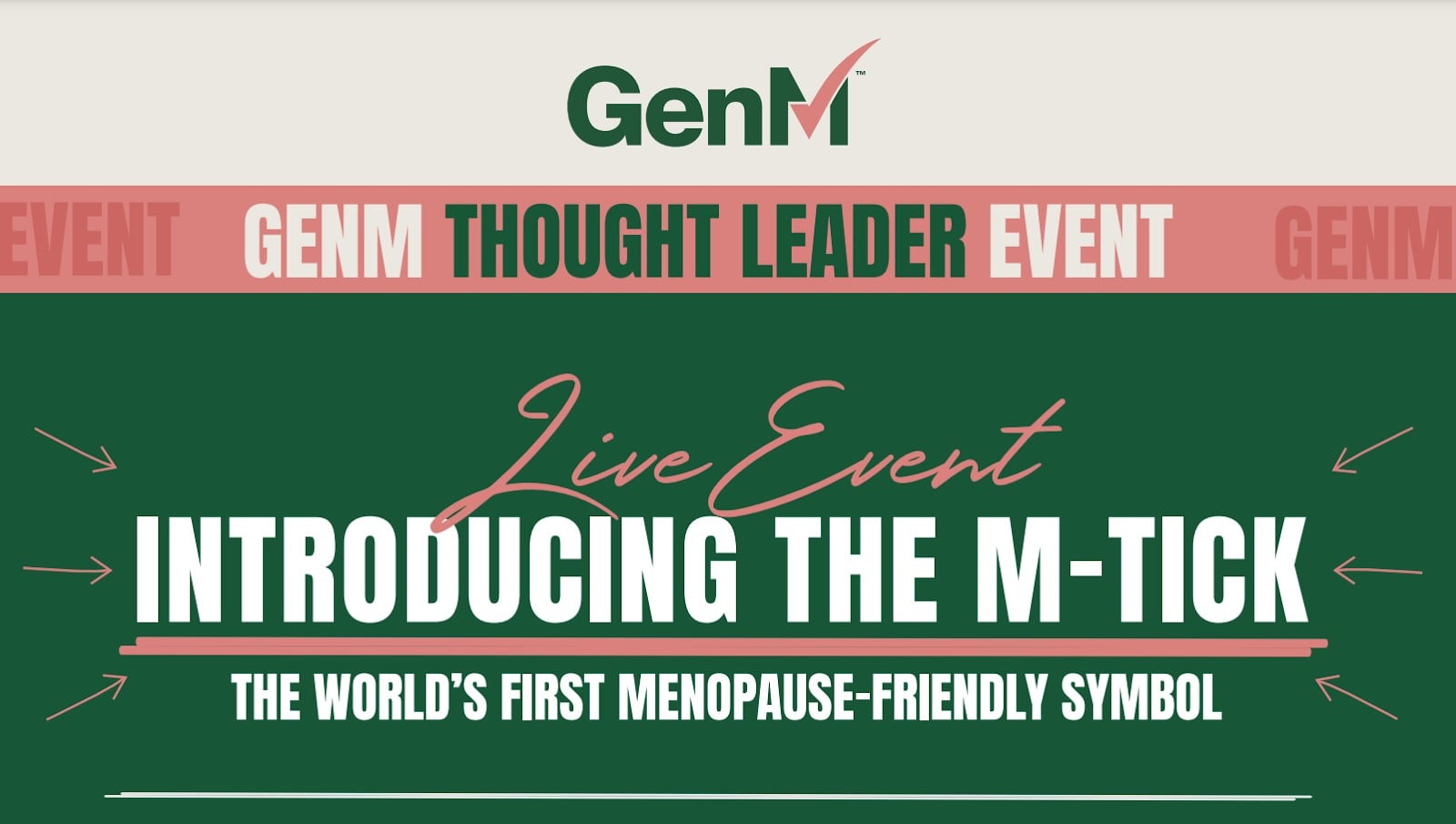By 2025, 1 billion women worldwide will be potentially menopausal. Yet most feel entirely overlooked and underserved at home, at work and across society, claims GenM, an organisation aiming to help brands recognise and respond to the needs of perimenopausal and menopausal women in the UK, which it estimates number 15.5 million.
GenM’s 70 partners, including the retailers Boots, Holland & Barrett and M&S, have made commitments to improve the menopause experience for consumers via better representing the menopause in product development, signposting and marketing campaigns.
“It’s not a life choice,” said GenM co-founder Heather Jackson. The menopause is “so much more than HRT”, she told FoodNavigator, revealing that 49% of women have no intention of using HRT. Natural and organic products are therefore essential to potentially ease the potential 48 menopause symptoms, she said.
Many in the food industry have been playing their part for years, she said, adding “it’s time now though for your brands to really shine out and serve that audience desperate to navigate their menopause their way – it’s all about choice and control.”
Examples of NPD tailored towards to the needs of perimenopausal and menopausal women include UK tea brand HotTea Mama. Its menopause tea employs natural herbs to support some of the most common symptoms - from irregular periods and heavy blood flow, to anxiety, lack of sleep and hot flushes. These ingredients include Raspberry Leaf, which it claimed can lessen heavy menstrual flows; Ginseng, believed to improve mood changes, and increase length and quality of sleep; Gingko Biloba, said to improve blood circulation and cognitive function; Liquorice, which it said can help reduce the occurrence and length of hot flushes; and Valerian, which it claimed reduces stress and anxiety, aid sleep.
Healthy snack brand Pep & Lekker’s products also now include 19% of daily magnesium, more than 10x that of a banana. “Magnesium is important to support immunity and women pre or post menopause are often in need of supplements,” said Founder and Director Susan Gafsen.
The opportunity to be purposefully commercial
Brands have the power and the ability to help not only raise awareness, but serve and support it better, stressed Jackson.
GenM’s market research shows 90% menopausal women say brands should be more inclusive to menopause, while 87% feel overlooked by brands. Over 90% have never seen any specific marketing/advertising for menopause products, Jackson told us, adding that 78% women said they'd be happy buying a product that would relieve, support, ease one of their symptoms or signs of menopause if labelled menopause friendly.

The world's only menopause friendly symbol
The organisation has also recently unveiled its M-tick menopause-friendly symbol to its partners. This ‘game changing’ symbol is the world's only menopause friendly symbol, it claims, that has been developed with its founding retail partner Boots. “The aim to make this as recognised in the next 5 years as vegan,” Jackson confidently revealed.

The importance of a healthy, balanced dietary pattern
The menopause push comes as a new scientific review from the British Nutrition Foundation said the best change women can make to their diet to help manage common menopausal symptoms is to follow a healthy, balanced dietary pattern.
The review found that healthier dietary patterns (such as Mediterranean style diets) may help to reduce the frequency and severity of vasomotor systems, such as hot flushes, as well as helping to manage body weight or body shape changes that many of those going through the menopause experience.
What’s more, women who have gone through the menopause are at increased risk of cardiovascular disease, such as a heart attack or stroke, and osteoporosis (weak bones). According to the nutrition charity, the added bonus of following a healthier dietary pattern is that it can help to reduce the risk of developing these conditions. A healthier diet can also reduce the risk of type 2 diabetes and some cancers in later life, it concluded, especially if dietary changes are combined with other positive lifestyle changes, like increased physical activity. Therefore, supporting women to adopt healthier dietary patterns before, during and after the menopausal transition, is likely to help ensure improved health throughout life.
The latest review provides a thorough update on the evidence looking at how diet and supplements can help with managing common menopause symptoms, debunking some common myths and showing that a healthy, balanced dietary pattern is really key, explained Sara Stanner, Science Director, British Nutrition Foundation who was an author of the review.
“Going through the menopausal transition can be a challenging time, with both physical and psychological symptoms occurring for many that can have a negative impact on daily lives and quality of life. Our new review highlights that there may be small changes we could make to our daily eating habits to consume a healthier dietary pattern that could help us maintain a healthy weight and possibly help alleviate symptoms such as hot flushes,” she said.
“But there is no ‘magic bullet’ when it comes to diet and supplements in managing menopausal symptoms, and it’s important that those going through the menopause are supported and given access to the information and tools needed to make the right changes for them.”
Heather Jackson will be speaking at FoodNavigator's face-to-face event on 29-31 March in central London, Positive Nutrition: Healthy Innovation for the Mass Market.
Our full list of speakers can be found here, and the advance programme is available here.
For more information or to register, click HERE.





